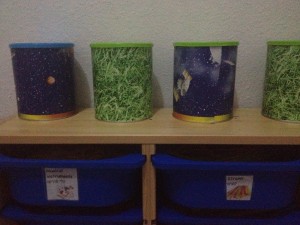Our Approach
At Kindergarten there are 35 children, split into two home classes; K1 and K2. In their home rooms, they have their own set of drawers and take part in their morning meeting, and their room circle time – we refer to these sessions as our full class teaching time. For the rest of the day, the children are free to move and choose between the learning centres in both classes and the garden, where we favour a ‘free-flow’ approach. Our practitioners based around the 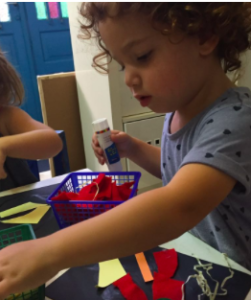 entire space encourage and support children to engage with each learning centre, and to develop the next steps on their personal learning journeys.
entire space encourage and support children to engage with each learning centre, and to develop the next steps on their personal learning journeys.
Children are also organised into 4 colour groups; each colour group dines together each day at lunch time, and each week have a number of specific teaching activities which are geared specifically at their stage of development and identified targets.
At Kindergarten snack times take place during the morning and afternoon periods and are open for the children to come to when they are ready. We promote independent use of the snack area, although it is closely monitored by staff. Children take their name from the board once they have eaten their snack and put it in the box, to show they have finished. Staff actively check to see that over the course of the morning and afternoon all children have visited the snack table. At the end of the day children are offered the ‘product’ of the afternoon cooking activity and/or dried fruit before going home.
We have a theme that lasts for two weeks at a time. Themes help us to learn about the world around us and plan meaningful activities that engage children throughout the fortnight. We also have an interest table where children and staff are invited to bring in items of interest to display from home, which link into the theme.
Every week we have two letters of the week – one in Hebrew and one in English. Our approach to teaching early phonics is based on the award wining UK system called ‘Letters and Sounds’ – which we implement slowly over the course of the year, in both English and Hebrew.
Every week ends with a Shabbat Shalom ceremony on a Thursday afternoon at 4pm, where parents are invited to join us. Each week a few children take turns in being the ‘Shabbat Helpers’ and they light the candles and give out the wine and reign over the chalah. If children have birthdays in the week, these are celebrated during our weekly Shabbat ceremony.
Learning Centres
The learning centres are the areas within the classrooms that we set up and furnish with specific resources to support specific areas of the early years foundation stage. Learning centres have displays, units with dedicated resources and a rug, table or specified area for play and exploration. Each morning, and each afternoon the staff carefully plan how to set up and lay out each learning centre based on the children’s needs, interests and schema. A fortnightly environmental plan is developed for each learning centre, which shows how the space will be used each day. This also enables the staff to provide the right targeted support in each area whilst the children are playing and exploring.
Our learning centres in Kindergarten include the following:
- Role Play
- Technology
- Construction
- Small World
- Fine Motor
- Art and Design
- Sensory
- Books
- Literacy
- Mathematics
- Gross Motor
Key Elements of the Day
Morning Meeting
During the morning meeting the children meet in their home class with their practitioners. They review the day of the week, and say good morning to each other. The practitioners will show the children each of the learning centres which have been set up, and give some explanation of how to use them. They will review the visual timetable of the day, and then choose which learning centre they wish to start at
Toileting focus
There are a few toiling toiling focuses spread across the day. This is where one identified staff member checks on every children to ensure that they visit the toilet during this period, or if they are still in nappies, that these are changed. Toilets are freely accessed by children all through the day, but these focus times help to ensure that children learn to regularly visit the toilet as a matter of routine.
Tidy up time!
Scattered throughout the day are a series of ‘Tidy up Times’ – these are accompanied with a song, and each child has a specific task to help with. This helps up to keep the nursery organised and accessible and teaches the children to have a sense of responsibility and ownership over their space.
Focused Activity Rotation (FAR)
During the daily FAR session, the children are grouped into their colour groups, and spend 15 minutes at 4 different activity stations. At each station, there is a carefully planned activity with one of the practitioners. Each activity has a clear start, middle and end and a learning intention to support children’s learning and development. FAR activities touch on each aspect of the early years foundation stage over the course of time, and include sitting and more active sessions. Example include making things, such as craft activities, challenge based activities such as throwing hoops, matching games, music and rhythm based activities – the list goes on! Every two weeks, we publish the fortnightly plan for parents, so that you can see the FAR activities planned for each day.
Adult Initiated Activities
These are activities that are planned during free play times, and children can flow in and out of as they wish. At 10:40 everyday there are two to choose from; one is always a 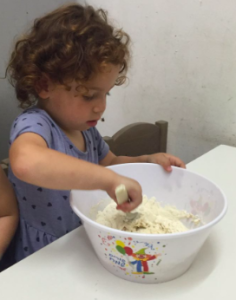 painting activity (painting with brushes, painting with rollers, painting with sponges, painting with hands etc) and one is always an outside/physical gross motor skills based activity. At 2pm each day, there is a cooking activity and at 2:45 there is one further adult initiative activity.
painting activity (painting with brushes, painting with rollers, painting with sponges, painting with hands etc) and one is always an outside/physical gross motor skills based activity. At 2pm each day, there is a cooking activity and at 2:45 there is one further adult initiative activity.
Literacy and Numeracy teaching sessions
Each day one of the colour groups has an extended literacy teaching session and one group has an extended numeracy teaching session. During the literacy session, we start to explore early phonics, initial word sounds, matching games. The older colour groups will start with phoneme-Grapheme correspondence (early reading skills). The numeracy session introduces and develops counting skills, shape and space concepts and pattern work. Each colour group has between 5 and 8 children, and so these teaching sessions are carefully targeted to the children’s stage of development and understanding. Their weekly numeracy and literacy session will last from around 20 minues at the beginning of the year and up to 45 minutes by the end, growing in length as the year progresses. These sessions will help lay a strong foundation for children in the core skills they will need as they progress on from Rainbow.
Daily Routine
We strongly recommend that children arrive before 8:25 in the mornings, so that they can take part in the daily morning meeting. Before entering the Kindergarten, children will hang their things in the cloakroom, and all children will enter through the K2 classroom.
7:30 – Open; self registration, free play and exploration of the morning’s learning centres
8:30 – Morning meetings in K1 and K2 classes
8:40 – Choosing a learning centre and free flow [and toileting focus]
9:20 – Tidy up time
9:30 – Focused Activity Rotation
10:30 – Free play and TWO adult initiated activities | Painting & Garden activities [and toileting focus]
11:05 – K1 Tidy up time
11:15 – K1 circle time
11:30 – Red group Lunch, Blue group extended circle time
11:45 – Blue group Lunch, and K2 Tidy up time
11:55 – K2 Circle Time
12:10 – Yellow group Lunch, Green group extended circle time
12:25 – Green group lunch
*** Nap Time – all children in K2 classroom***
2:00 – Free play, use of K1 and outside space and COOKING ACTIVITY [and toileting focus]
2:45 – All sleepers up, and K2 classroom fully functioning as learning centres | Numeracy and Literacy daily teaching sessions for specific colour groups
4:00 -Tidy up time
4:10 – 3 Story Circles and snack from cooking activity
4:30 – Close
4:30 – 5:50 – Afternoon Club upstairs for late stayers
The Kindergarten is a new group for us this year, and whilst it is based on many of the things that we have been doing for years with the older end of Pre-school, there will be a time of adjustment and our routines, systems and plans outlined above may take a while to settle down, and may be tweaked or changed as the year progresses.
Family Pictures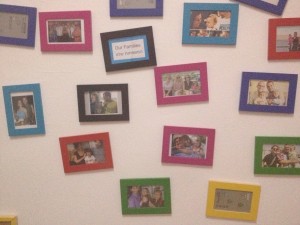
All our families are different but all are very special. The first thing that you will see when you enter our nursery is a wall with framed pictures of all our families. When children and families come in and see their own pictures on the wall – they know that Rainbow is a place where they ‘belong’. Children feel safe when they see familiar things around them, and by having pictures of themselves and their families on the wall, not only do we build a sense of security for them in the physical environment, but their sense of self-esteem is also developed.
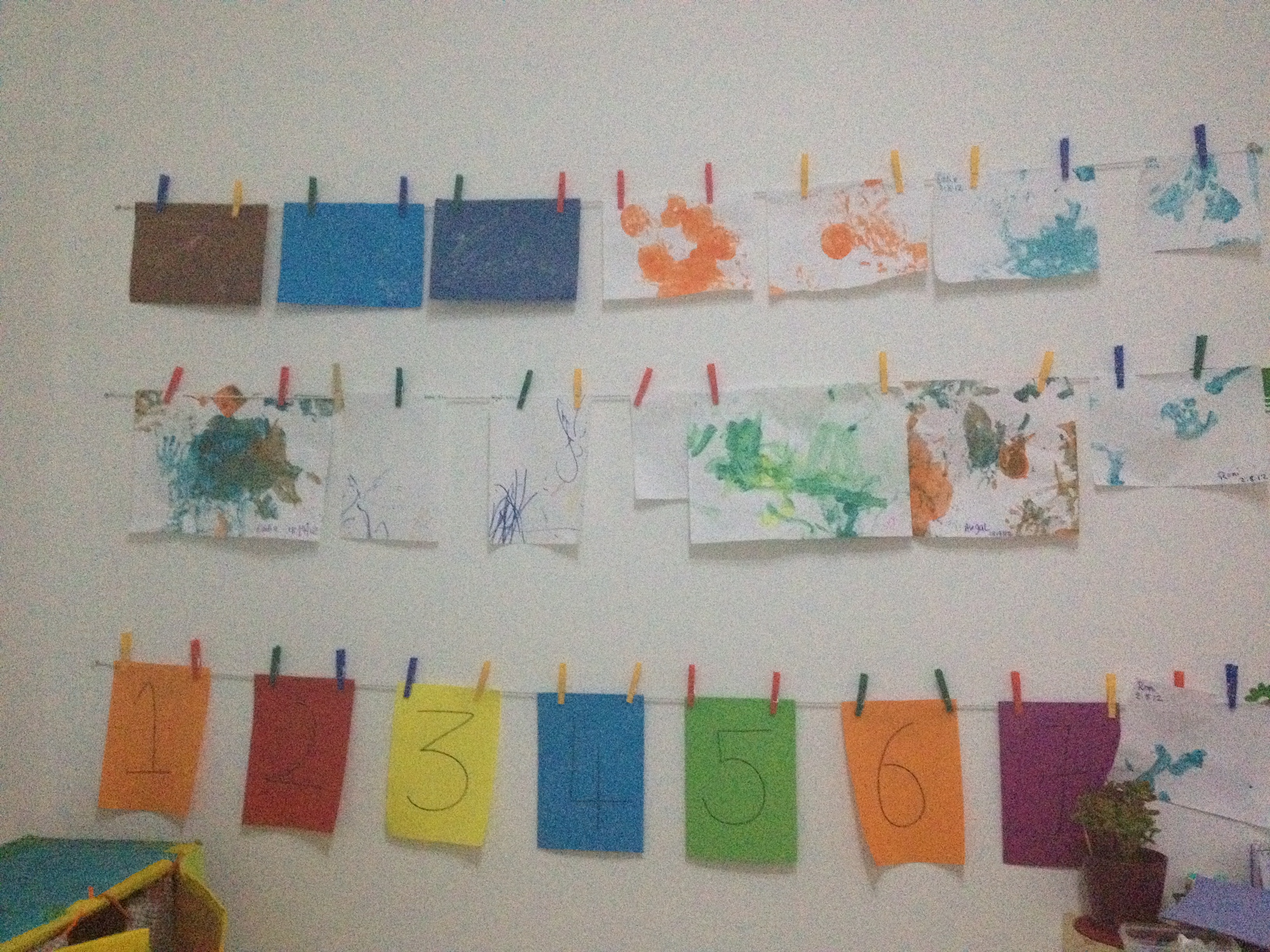
Displays
We believe that it’s very important to display children’s work and creation in ways that show we really value what they’ve done. This is important for their self-esteem, as they seen their own work displayed around them. A language rich environment helps children understand that ‘print carries meaning’ – we make sure that all our displays have a clear explanation of what we’ve done in English and Hebrew. We put children’s names on the front of their work, so their names are visible; we encourage them to be proud.
A language rich environment is important, children need to see print in their environment from a very early age. They grow to understand that print carries meaning, and this is the first step to learning to read. Its important that writing is displayed in a variety of ways, including both handwriting and printed text. Everything in the nursery is labelled, not just so we all know where things go but also to provide an environment rich with language!
Festivals
We learn about all the festivals, and have regular PACE (Parent and Children Events) activities related to all the holidays. Last purim, we all gathered on the roof  and the staff and parents performed a purim spiel for the children! Each week we have a small shabbat ceremony, where we light the candles and eat Chalah – all the parents are invited! We have tree planting every Tu-Bishvat, and find our own special way of celebrating and exploring each festival.
and the staff and parents performed a purim spiel for the children! Each week we have a small shabbat ceremony, where we light the candles and eat Chalah – all the parents are invited! We have tree planting every Tu-Bishvat, and find our own special way of celebrating and exploring each festival.

